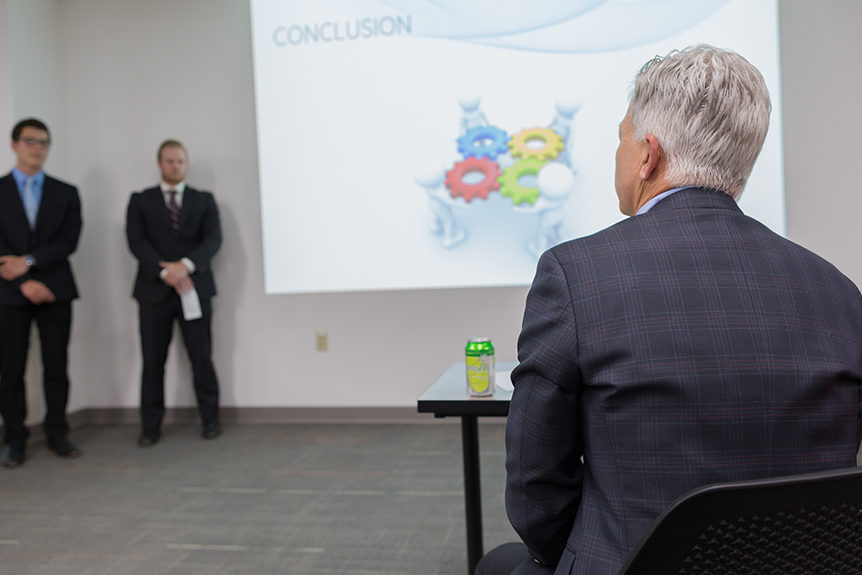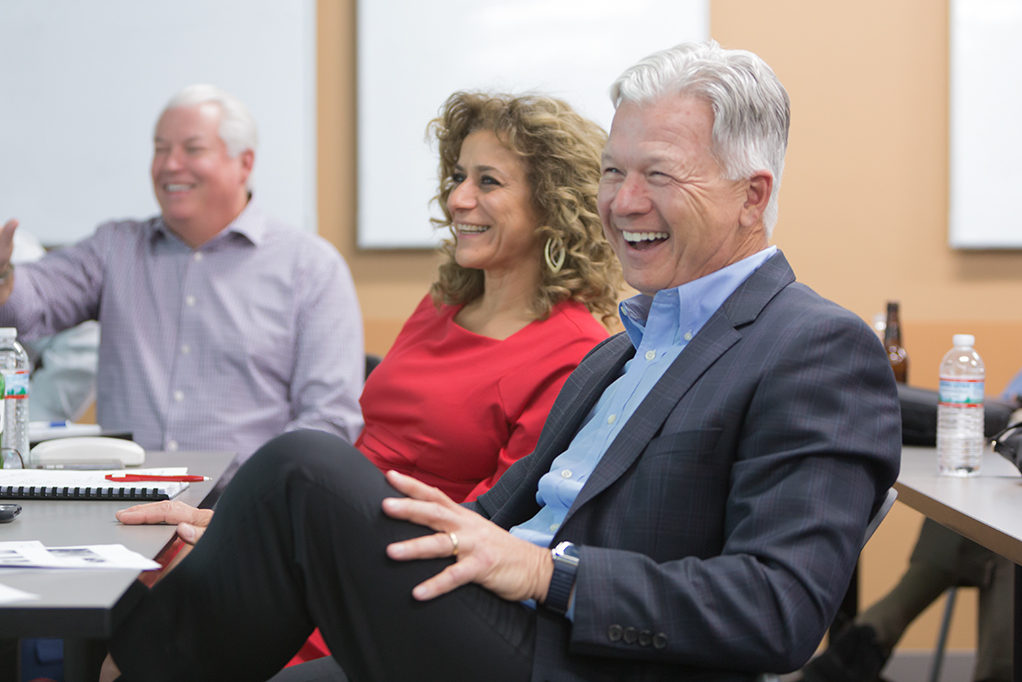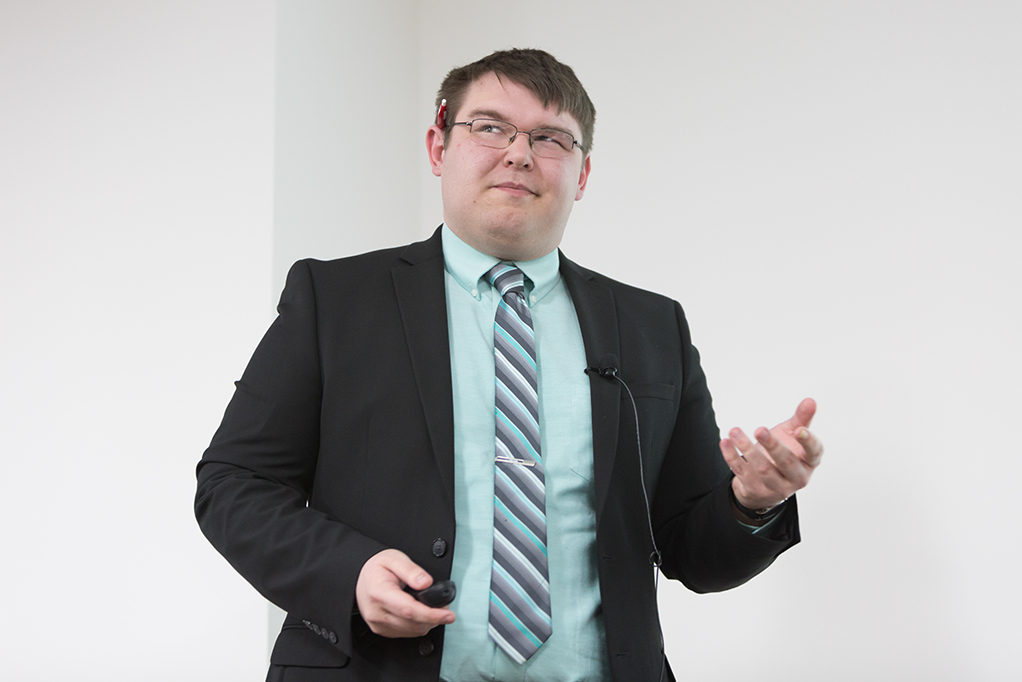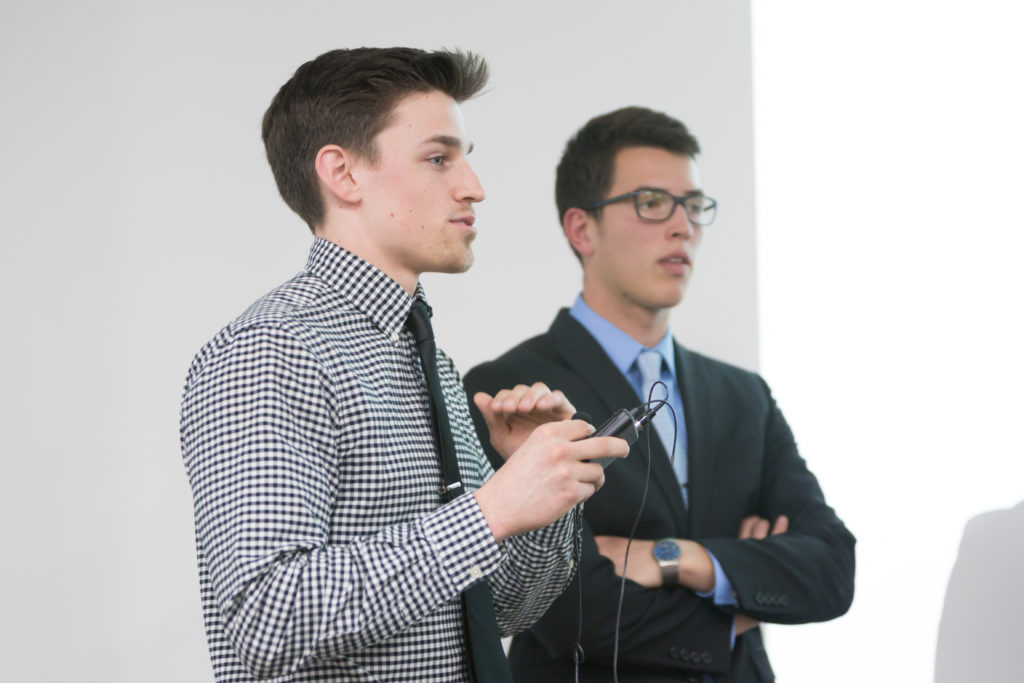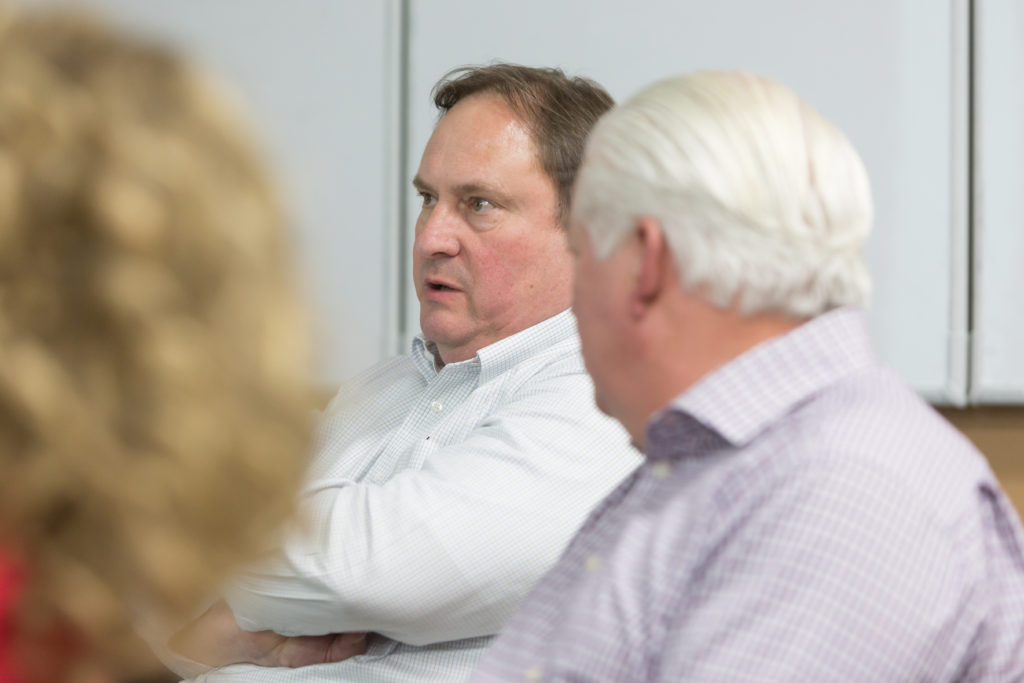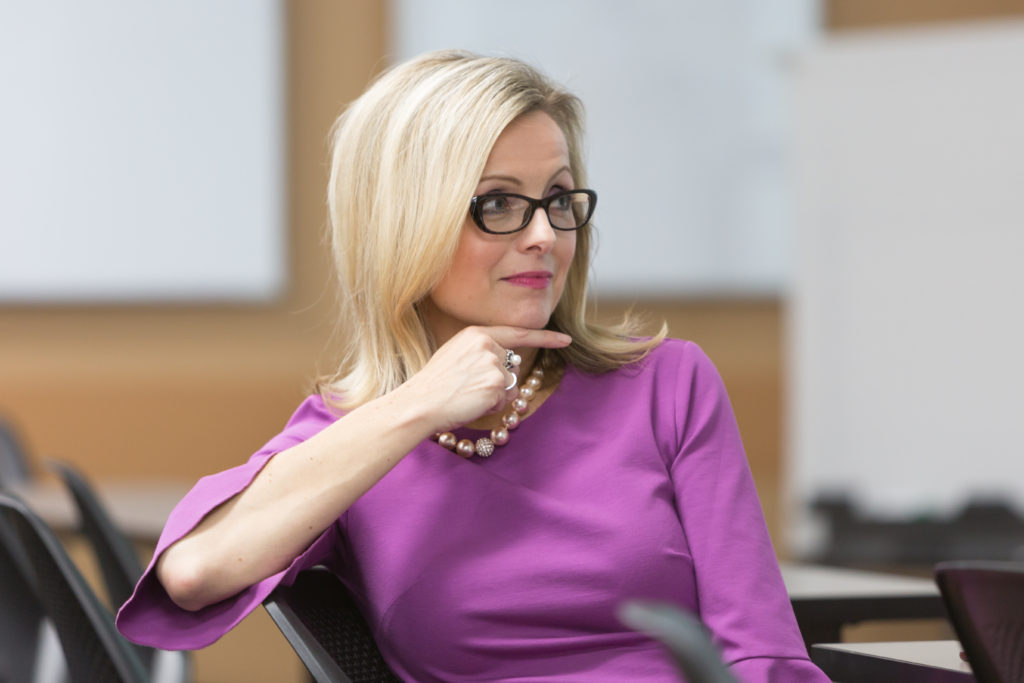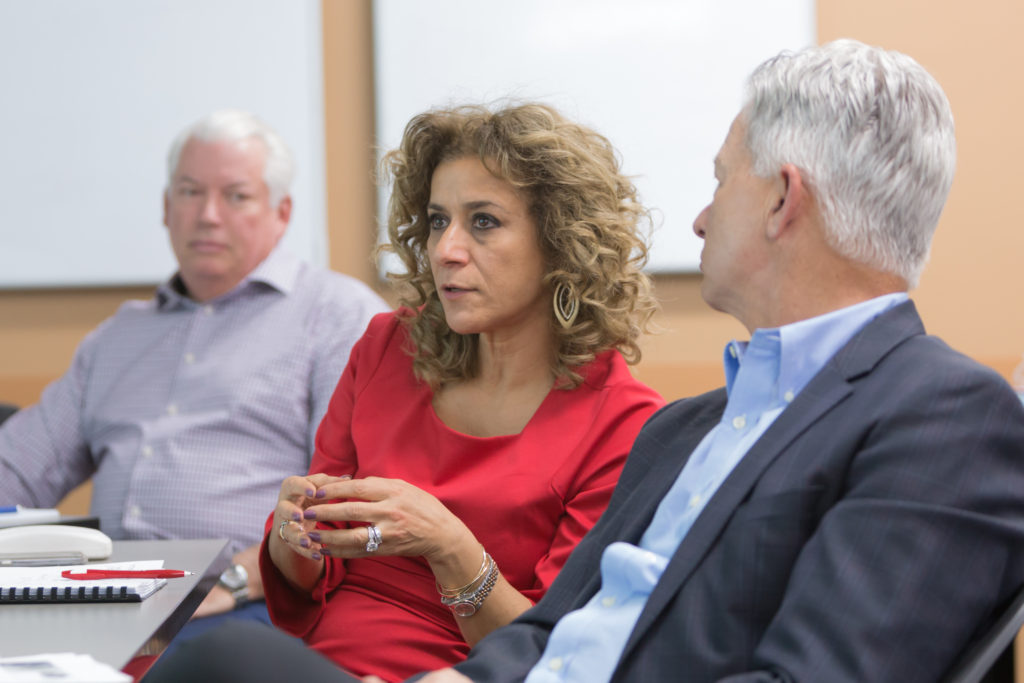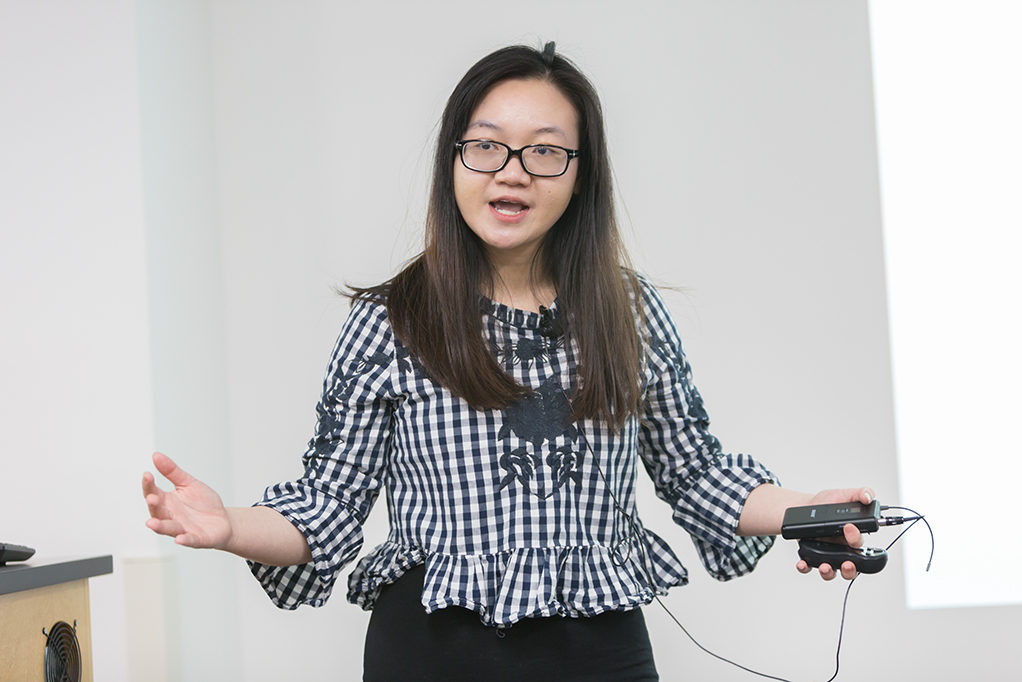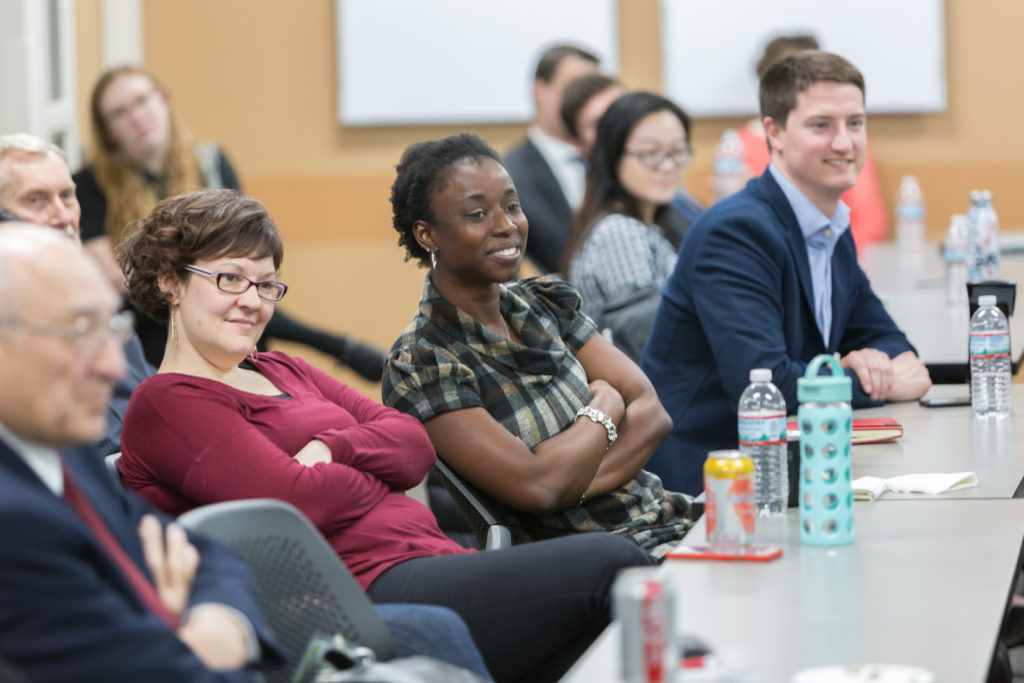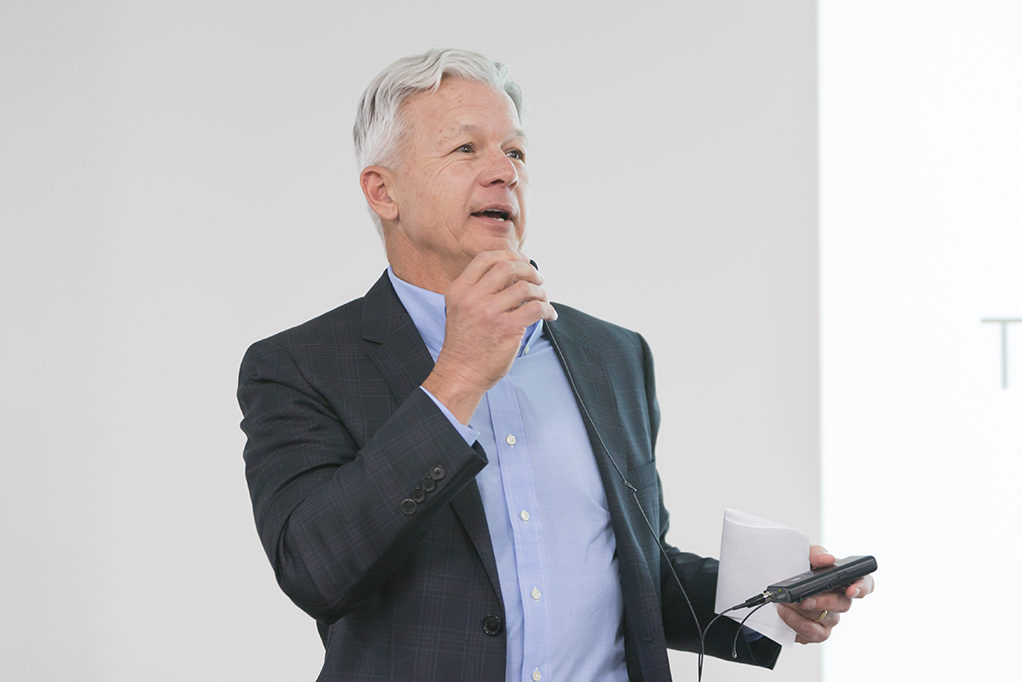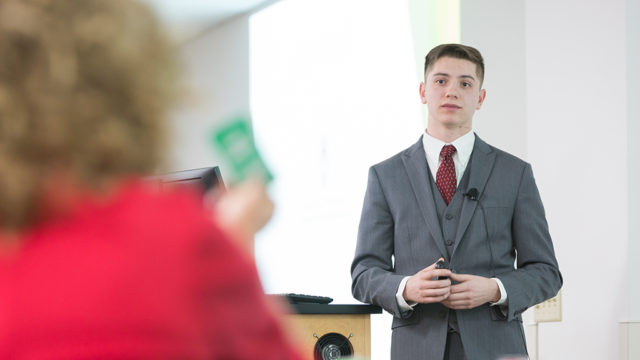
Teaching entrepreneurial skills through mentorship and a real-life ‘pitch’
By Katie Gerhards
Photos by Todd Brown
“We all know that there is an opioid crisis in this country. But there is a more insidious problem sweeping the nation.”
That was the opening line of first-year PharmD student Kyle Wayner’s business pitch to a panel of potential investors at the University of Wisconsin–Madison School of Pharmacy’s first SHARx Tank, which is the culmination of a semester of work and discussion between students, faculty, and an engaged, business-minded alumnus, George Zorich (BS ’78), CEO of ZEDpharma.
Wayner’s pitch was referring to the rampant abuse of dextromethorphan, a common cough medicine ingredient.
His prescription for a fix: Toxic Overload, a game to educate middle- and high-school students about the hazards of abusing cough medicine, as well as other over-the-counter medications and their potentially destructive interactions. Wayner, with proposed company Rx Games, was just one of five PharmD student groups to present their entrepreneurial ideas for a chance at winning a $4,000 scholarship for first place, or $1,000 for second place—money invested by Zorich himself.
“I want the students to know that there are rewards for ideas,” says Zorich, who also previously served on the School’s Board of Visitors.
“I think entrepreneurship is where our roots are as pharmacists.”
–Beth Martin
This co-curricular entrepreneurial student group is one way Zorich and School of Pharmacy faculty hope to introduce student pharmacists to what’s possible through innovation and creative thinking, and how to make their ideas into reality.
“I think entrepreneurship is where our roots are as pharmacists,” says Beth Martin, assistant dean for Assessment, Teaching, and Learning and associate professor in the Pharmacy Practice Division.
“I grew up in that environment, with my dad owning a community pharmacy. The majority of pharmacists used to own their own stores. They were entrepreneurs and risk-takers. They were not just clinicians, but also business people,” she says. “We’re starting to see the need for that focus even more.”
Creating the group
The entrepreneurship group and “shark tank” idea came out of discussions between Zorich, Martin, and other School of Pharmacy faculty members, including Dean Steve Swanson; Dave Mott, division chair and professor of the Social and Administrative Sciences Division; and Barry Gidal, division chair and professor of the Pharmacy Practice Division.
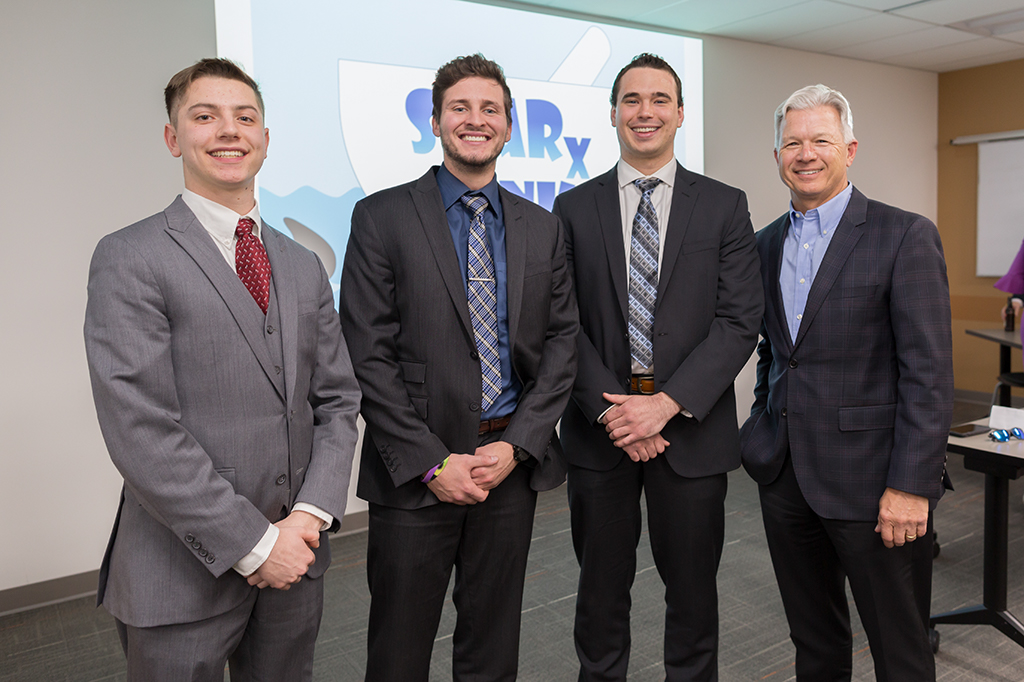
“The Accreditation Council for Pharmacy Education (ACPE) recently made entrepreneurship an essential skill for us to teach in our curriculum,” says Martin. “And although there are other avenues in our curriculum that already touch on entrepreneurship and innovation, this is a way for us to take it one step further, because we already know that graduates of our PharmD program have been very successful entrepreneurs.”
Aside from this entrepreneur group, PharmD students also get to practice entrepreneurship skills in a communication course where students work in teams to help a pharmacy innovate something or overcome a barrier around communication or workflow issues, and they learn the process of how that’s done.
The Industry Pharmacists Organization (IPhO) student chapter at the School of Pharmacy, which recently participated in a national competition to design a drug launch, is yet another way for students to nourish their entrepreneurial spirits.
Zorich served on the board of the American Society of Health-System Pharmacists (ASHP) Foundation for six years, and during that time, he identified a widespread need for nurturing key skills that move pharmacy forward.
“On a national level, I don’t think we’re doing enough as a profession to get better at communication skills, persuasion skills, entrepreneurial skills,” he says. And that need trickles down to where pharmacists are getting their start.
With his 35 years of experience running pharmaceutical companies, Zorich considered the new ACPE curriculum requirements and what he’d seen on a national level at the ASHP Foundation, and simply volunteered to make a difference in the education of pharmacy students, starting at his alma mater.
Zorich took it upon himself to write a book, Entrepreneurs in Pharmacy and Other Leaders, that profiles pharmacists who have successfully started a business or stepped into a nontraditional role, including other UW–Madison School of Pharmacy alumni, such as Curt Mueller, the founder of Mueller Sports Medicine. “Students need to hear those stories,” says Zorich.
“Thanks to George, we had the book as a tool,” says Martin. “But the next challenge was how to make it into something substantive for our students.” So they reached out to all UW–Madison School of Pharmacy PharmD students to see if they had ideas they wanted to explore as part of an informal group, led by Mott, Martin, and Zorich. The catch: It would meet five times throughout the spring 2018 semester—on late Friday afternoons.
In shark-infested water
Just eight brave, entrepreneurial souls emerged for the first meeting.
“I have always been interested in being an entrepreneur and a businesswoman,” says Trinh Trinh, first-year PharmD student. “Plus I had an idea I wanted to develop, and I wanted to have something to motivate me to think fast. Joining this club was one way to find out if I’m really interested in industrial pharmacy. And after this, I think I have found my niche.”
Trinh was joined by Wayner and second-year PharmD students Dean Bowen, Griffin Budde, Bernard Brooks, Gregory Norsten, Dakota Rau, and Michael Heltne.
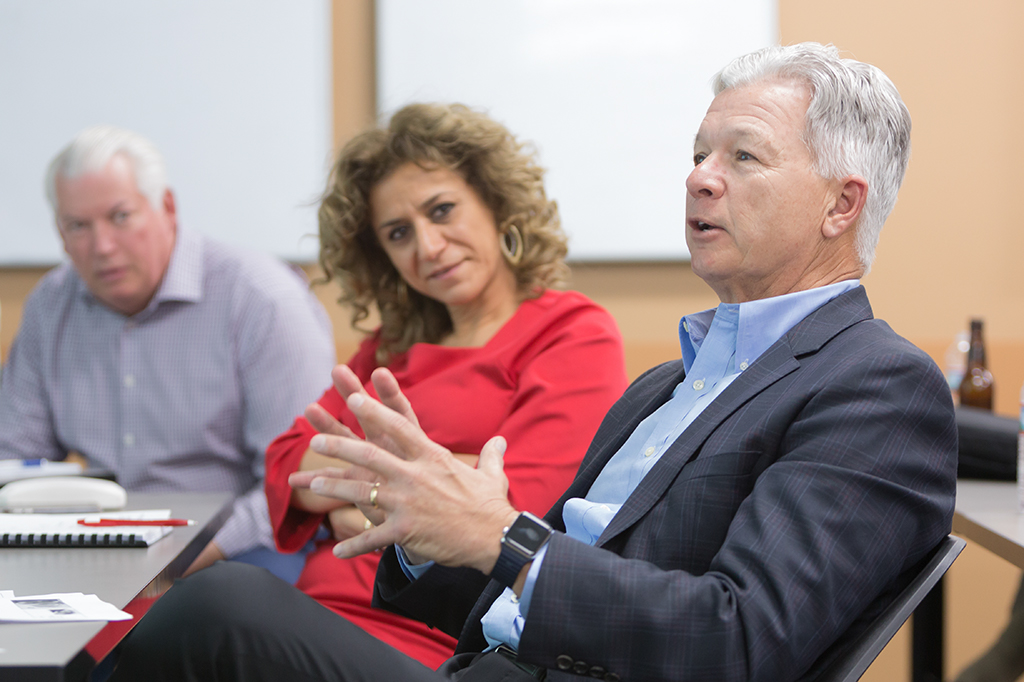
Through the semester’s five meetings, those eight participants sharpened, scrapped, and revised their ideas to be relevant in today’s pharmacy landscape, relying on the expertise of Mott, Martin, and Zorich, as well as the feedback of their fellow students.
“The students in this group are developing an idea—a solution to a health care problem—and have been working through the semester on it, bouncing ideas off of us, and getting examples of entrepreneurial leaders profiled in my book, some of whom are UW–Madison School of Pharmacy graduates,” says Zorich.
The eight students broke into five teams, and at the end of the spring semester, leapt into the SHARx Tank to see if their ideas could get a bite.
“I had a few ideas going into the group, and I’m sure many students in the School of Pharmacy have ideas of their own,” says Brooks. “This group helped to turn these ideas into possible businesses in the near future with realistic outcomes.”
The “investors” in this scenario included School of Pharmacy Dean Steve Swanson and successful, business-savvy alumni of the School: Azita Saleki-Gerhardt (BS ’88, MS ’91, PhD ’93), president of operations for AbbVie, one of the largest pharmaceutical companies; Dan Luce (BS ’81), national director of pharmacy affairs at Walgreens; David Hager (PharmD ’05), director of clinical pharmacy services for UW Health; as well as Zorich, who has spent the last 25 years building and selling health care firms.
“It was intimidating to say the least,” says Budde, who, with Bowen, presented an idea for a medication therapy management service to help people in long-term care facilities reduce unnecessary or redundant prescriptions.
“Experiences like that are priceless and are one of the countless benefits of having Wisconsin’s great alumni base supporting you.” –Griffin Budde
“When one of the sharks starts the competition by saying she runs operations for the fifth-largest pharmaceutical company in the world, it gets your blood pumping,” Budde says, referring to Saleki-Gerhardt’s impressive qualifications. “With that said, it was such an amazing opportunity. Experiences like that are priceless and are one of the countless benefits of having Wisconsin’s great alumni base supporting you.”
Following each presentation, the industry-seasoned alumni asked pointed questions about how the students would differentiate themselves from competitors, navigate potential legal hurdles, and how their ideas would translate into profits.
“It was both nerve-wracking and exhilarating,” says Wayner, who developed his game with Social and Administrative Sciences Assistant Professor Olufunmilola Abraham, who has a background in gamification. “I thought I knew what type of questions they were going to ask, but they ended up being very different. They were hard to answer, but they really helped me grow and think critically about the next step for my business.”
When all was said and done, the panel took a vote: Budde and Bowen took second place, and Wayner took home the top prize.
“When Kyle Wayner first approached me to mentor him for the SHARx Tank, I was super excited that a student pharmacist was interested in improving medication use and patient safety for kids,” says Abraham. “Kyle is a hard-working student who has great potential to be a leader and innovator in pharmacy and patient care.”
Developing an innovative mindset
Despite struggling to answer detailed questions from industry professionals with only one to two years of pharmacy school under their belt, the PharmD students not only survived—but they also managed to impress their esteemed judges.
“The level of composure and level of thought from these students was outstanding,” says Luce. “This competition was about having an idea, learning the process, and experiencing the preparation and research that goes into it, and these PharmD students will have those skills for the rest of their careers.”
And Zorich, who has been working with the students since day one, watching their progress, is equally impressed. “Everyone in the class of 2019 or 2020 is going to have an idea, but how many of them are going to know the steps to get to market? These students did that well,” says Zorich. “They showed poise and that they could build out an idea and present it.”
Wayner, like many of the students who participated, plans to keep pursuing his idea for an educational game. “I’ve played games all my life, and I’ve taken classes about how games can be more effective in teaching and assessing education,” says Wayner. “I wanted to incorporate my background into a solution to medication misuse.”
“I think a PharmD is a springboard degree to everything.” –George Zorich
That blend of personal interest and professional expertise to solve problems is precisely what Zorich is hoping to instill in pharmacy students.
“Once these PharmD students are out in the workforce, they’re going to see things that could use improvement every day,” says Zorich. “My goal would be that they see those things and think, ‘There’s a better way of doing that. I could develop an app, service, or OTC product that’s better than that.’”
By making this entrepreneurship group open to PharmD students at every level, Martin and Zorich are hoping to plant the seed early, spurring curiosity and prompting students to ask why things are done a certain way, instead of just going along with the status quo.
“I want students to ask, ‘Can we do this differently? How can pharmacy be a part of this? How can I use my skills and expertise to make a difference?’ I would hope every pharmacist would have that mindset,” says Martin.
Mott also sees this group as an opportunity to re-consider policies and organizational frameworks, since the students are able to assess engrained ideas through a younger, fresher lens. “Entrepreneurialism doesn’t have to be focused on a product,” he says. “Why not innovate on the way drug benefit insurance is structured?”
Blazing the path forward
Among the stories of other successful alumni and pharmacy leaders, Zorich also shared his own nontraditional career path with the students in the entrepreneur group, to show them the value of thinking outside of the box.
At a time when nearly all pharmacy graduates pursued graduate school or went into community or hospital pharmacy, Zorich instead went into sales at Eli Lilly—where everyone who joined the company had to start. “I was an outlier,” he says. “Someone said it was a waste of a pharmacy degree, and I never forgot it because they were wrong. I think a PharmD is a springboard degree to everything.”
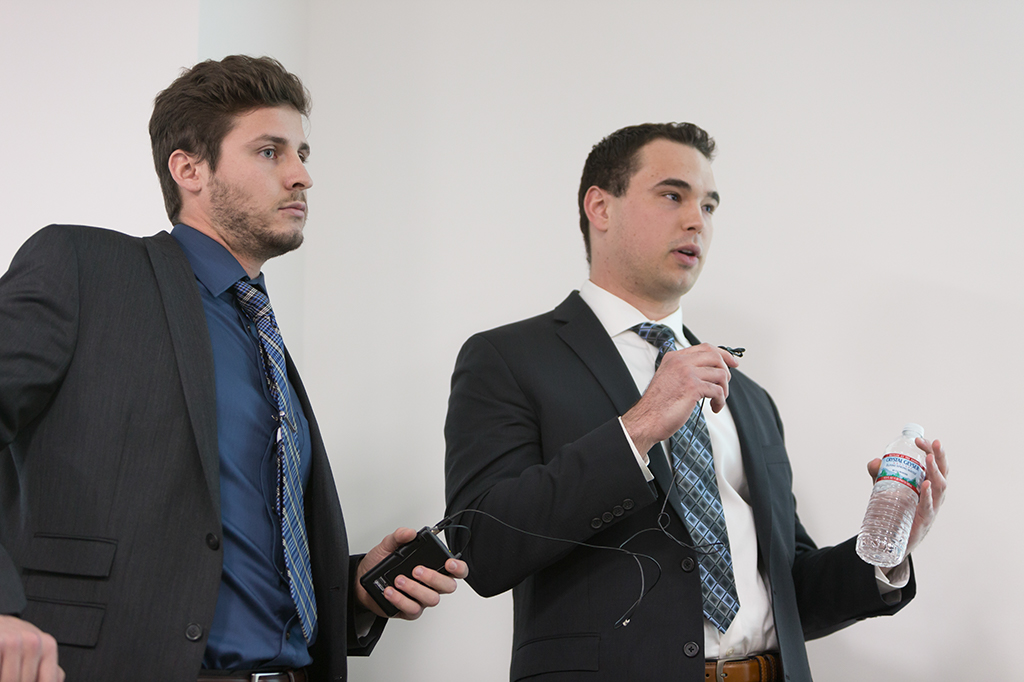
Budde, who is also the president of the UW–Madison IPhO student chapter, agrees. “Pharmacists have such a diverse set of skills but are usually funneled into clinical or community pharmacy,” he says. “Pursuing entrepreneurship allows future pharmacists to use their creative and innovative skill sets. A PharmD is truly a degree that has no ceiling, but it takes opportunities like the entrepreneurship club to show students their potential.”
With the new ACPE mandate, pharmacy schools across the nation are seeking ways to teach entrepreneurial skills in a meaningful way. “Schools are asking, ‘If we need to teach entrepreneurship as a part of accreditation, how do we do it?’” Zorich says. “Maybe Wisconsin gives us that answer.”
He plans to share the results of the School of Pharmacy’s entrepreneurship program at the 2019 American Pharmacists Association meeting and discuss it with pharmacy educators to expand this type of program across the country.
In fall 2018, the entrepreneur group at the UW–Madison School of Pharmacy will be back, but it might be in a slightly different form. If other alumni want to jump in and sponsor student scholarships from year to year, that could be one way to keep the program sustainable with a real buy-in for students, says Martin.
“This is about making something special out of a pharmacy career.”
Read more about George Zorich’s book, Entrepreneurs in Pharmacy and Other Leaders.
Learn more about the School of Pharmacy’s PharmD program.
